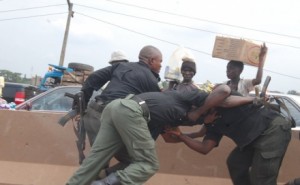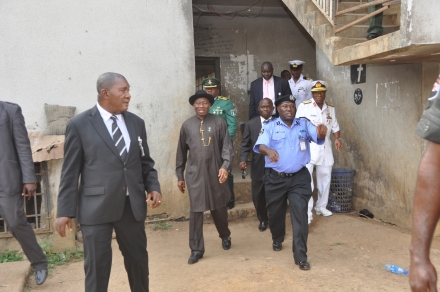Today makes it one week since President Goodluck Jonathan paid his famous surprise visit to the Police College, Ikeja to see first-hand for himself the rot he had seen on a Channels TV documentary. True enough, the documentary was not a movie, but it was the reality on ground. It has turned out that the rot and dilapidation is not unique to just the Police College, Ikeja, but also at 7 other police colleges across the country. Since then, tons of articles have been written analysing and reporting the situation. It has also inspired the Presidency and the Senate to institute probes into the budgetary allocations to the police training institutions.
Personally, I was not surprised, and I didn’t expect any Nigerian abreast of the happenings in this country to be. Maybe it is because I grew up in a neighbourhood opposite a police college, so to an extent, I knew of the rot and inhumane living conditions in which Nigeria attempts to turn young men and women into fine police officers.
What the documentary and the visit has served to accomplish is to expose the underlying reason why we have an ill-trained, unprofessional police force. It is not because the men in black join the police force with the intention to become official brutes and lawless law enforcement officers.
What we have is a situation where people join the police, what is ordinarily a noble and honourable profession, because they have no other options. These people are mostly those from the lower middle classes whose options are very limited. After trying out for every job, sometimes after dropping out of school, they then decide to try for the police force. They are then put into training schools where they are treated as though they were chickens, in the words of President Jonathan. They are ill-fed, poorly accommodated, barely remunerated and at the end of their training, they have to bribe to even get their own uniforms.
These fresh cops with barely an understanding of the law are then given guns and sent out to the streets to ‘protect’ the society. Unfortunately, they look at their hands and what they see is not a form of responsibility, but rather a source of power. The power is then severely misused a lot of times judging by the number of crimes the police is accused of committing in our country. It is so bad that many times, the difference the police and the bad guys is that the police has official backing, which also means they rarely get to account for their excesses.
The situation is so bad that it is rare to even see the children of top police officers joining the force. We have entirely left the force to the lower classes; a job for them to do keep them busy, while we scorn and turn up our noses at them.
This is not entirely our fault, but it is evidence of the extent of corruption and rot in the Nigeria Police Force. Despite the billions allocated yearly for the training of policemen, we still get faced with deplorable training institutions like the one that President Jonathan visited a week ago. It is such a saddening situation.
The Federal Government cannot afford to allow this case die a death. It must get to the root of the matter; make the bodies responsible for the police, from the Police Force Headquarters to the Ministry of Police Affairs and the Police Service Commission account for the monies that have been allocated over the years. It is also about time that the government begun to implement all the numerous reports of reforms panels that have been set up.
 Unless we turn the service conditions around and change it from being the end point of those who have no other job to do, we would continue to have very inefficient policing in our country.
Unless we turn the service conditions around and change it from being the end point of those who have no other job to do, we would continue to have very inefficient policing in our country.



Leave a Reply